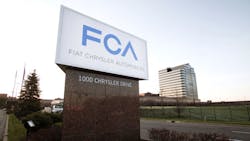Fiat Leans Toward Trump as Industry Agonizes Over Fuel Rules
When a group of 17 of the world’s largest automakers sent a letter to President Donald Trump on June 6 asking him to compromise with California on vehicle-emission standards, one company was notably absent from the list of signatories: Fiat Chrysler Automobiles NV.
That holdout stance is not atypical for the automaker, known for its Jeep SUVs, beefy pickup trucks and Italian sports cars. Most automakers have called for tapping the brakes by making adjustments to national fuel-economy and emissions standards in light of low gasoline prices and soaring SUV sales. But Fiat Chrysler’s public comments hew closer to the Trump administration’s reverse shift on Obama-era regulations.
“They are looking out for their own best interest, as every company and every person does at the end of the day,” said Brett Smith, director of propulsion technology and energy infrastructure at the nonprofit Center for Automotive Research.
General Motors Co. suggested a national mandate for electric vehicles in 2021 in its written comments to regulators. Honda Motor Co. called for “strong 2025 targets” and said it did not support a Trump administration proposal to freeze the standards. Ford Motor Co.’s top executives said publicly they “support increasing clean-car standards through 2025 and are not asking for a rollback.”
In its written comments submitted to regulators last year, Fiat Chrysler said it agrees with one of the Trump administration’s central arguments: Stricter fuel-efficiency mandates drive up new vehicle prices, keeping older, dirtier and less-safe cars on the road longer. It said this could undermine the very air quality and safety benefits the Environmental Protection Agency and National Highway Traffic Safety Administration rules aim to deliver.
The EPA and NHTSA are preparing a final rule now that could differ from the post-2020 freeze the agencies recommended last year.
“Our support for one national program and the mid-term evaluation remains unchanged,” Fiat Chrysler said in an emailed statement last week after its peers’ letter became public. “It was made clear when we were one of just two automakers to testify last September at hearings held by the EPA and NHTSA.”
When the Trump administration proposed stripping California of its authority to limit tailpipe greenhouse-gas emissions last August, Fiat Chrysler made one of the industry’s strongest public endorsements of the federal government’s right to do so.
“It remains our hope that conflicts over preemption will be avoided by an agreement,” the automaker wrote in comments submitted to the government last October. “However, in the absence of such an agreement, FCA agrees that the law gives the federal government the authority to preempt state standards that are directly related to fuel economy.”
Fuel-Economy Laggard
The Trump administration in February terminated months of talks between federal regulators and California officials about a common standard. Automakers have urged the two sides to reach an agreement to avert a prolonged legal battle with California, but the White House has rejected that appeal. A dozen other states adhere to California’s emissions rules -- a bloc that accounts for more than a third of U.S. auto sales.
Fiat Chrysler was among the first car companies to abandon sedans and, according to market research firm Edmunds, its model lineup has the lowest average fuel economy among the six biggest automakers. But almost every major manufacturer is boosting production of higher-emission SUVs and trucks for the U.S. market.
The industry acted in unison urging the Obama administration to adjust fuel economy and cried foul when the EPA in 2016 determined no changes were needed, months earlier than expected. Automakers quickly appealed to a newly elected Trump early in 2017 for relief. The plea for a compromise between California and federal regulators reflects a desire to avoid costs from a split standard and the potential for years of uncertainty caused by a courtroom battle over the rules.
“It’s important for them to communicate through the general public that yes, in a way, they very much do care about the environment, but they also understand they have a market to serve and to try to sell to,” Smith said.
Under Chief Executive Officer Mike Manley, who took over last July, Fiat Chrysler has ramped upplans to electrify its lineup, in part to stay competitive in China and Europe where emissions standards are tougher. The automaker still stands to benefit the most from Trump’s proposed freeze, according to Alan Baum, an independent auto analyst in West Bloomfield, Michigan.
“They’re way behind, by design, on electrics and hybrids,” Baum said. “To the extent there’s any improvement or required improvement in fuel economy, that’s really tough for them.”
The Italian-American company has been a laggard even by industry standards. It ranked last among 13 car companies for both fuel economy and carbon emissions in the EPA’s evaluation of 2017 model-year sales. It's late CEO Sergio Marchionne publicly griped about having to sell a money-losing battery electric vehicle in California to meet that state’s more stringent emissions standards.
The company has pointed out that demand for low-emissions models remains muted in much of the country, with hybrid and plug-in electric vehicles accounting for just 1.5% of U.S. vehicle sales through July of last year, according to IHS estimates. “The final rule must be based on the market realities of today,” Fiat Chrysler said in its written testimony on emissions-policy revisions.
About the Author
Bloomberg
Licensed content from Bloomberg, copyright 2016.
